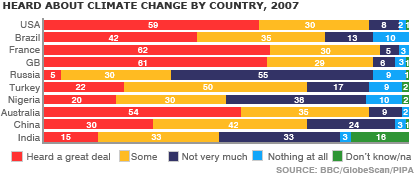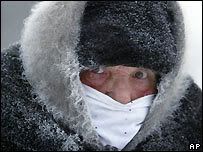Mr. Whipple And Global Warming
 Mr. Whipple, the strange man with the fixation to squeeze toilet paper rolls, proved the old advertising adage that you can't just tell somebody to buy something. Instead, you have to bludgeon them into it. Or, as they say in ad school, repetition builds recognition, and recognition builds sales.
Mr. Whipple, the strange man with the fixation to squeeze toilet paper rolls, proved the old advertising adage that you can't just tell somebody to buy something. Instead, you have to bludgeon them into it. Or, as they say in ad school, repetition builds recognition, and recognition builds sales.So year after year, Mr. Whipple got caught in the aisle white-handed, squeezing his beloved Charmin. And people bought it, and life was good at P&G or whatever corporate demon foisted this heinous campaign on us.
Mr. Whipple, metaphorically speaking, is whispering in my ear, telling me this is quite simply the most amazingly unbelievable chart ever produced:
 We have BBC to thank for it, because they stuck it on the bottom of a story about low recognition of global warming in Russia. Scan over to the right, to the green "don't know" numbers and you'll see that absolutely everyone in Brazil, Australia and France has heard of global warming.
We have BBC to thank for it, because they stuck it on the bottom of a story about low recognition of global warming in Russia. Scan over to the right, to the green "don't know" numbers and you'll see that absolutely everyone in Brazil, Australia and France has heard of global warming.Yup, there's not one up-Amazon indigenous tribe member walking about with a bone through his nose who has not heard of global warming. Way out in the Outback where people know a thing or two about heat, there's not even one Fosters-swilling town drunk who couldn't tell you why the appropriate term is "climate change." And all the epicures and snobs in Paris, not to mention every single French sheep herder down in the Pyrenees, can sit down over a croissant and discuss the finer points of urban heat islands and polar ice cycles with you.
Why, even in dumb ol' America, where we're all too fat and sassy in our SUVs to ever actually learn anything, a full-blown 99% of us know about global warming. That 14-year-old gal Warren Jeffs wed up maybe didn't get a chance to find out about it yet, I guess.
To cover up the sheer audacity of making such claims as these, BBC tells us:
The survey was conducted for the BBC World Service by the international polling firm GlobeScan together with the Program on International Policy Attitudes (Pipa) at the University of Maryland. GlobeScan co-ordinated fieldwork between 29 May and 26 July 2007.The question itself is straightforward enough on the survey instrument:
M1. How much have you heard or read about global warming or climate change?The methodology section of the survey is suspiciously unrevealing, just giving the number of people surveyed per country, when they were asked and a few sketchy details. There are no clear reasons in the information available that would give us a hint at why such improbable results were posted. I see two possible reasons:
- The data are true. We may indeed have reached a point where the media have such compelling reach that if they all get singing from the same page, people will hear about it. I find this impossible to believe. There are just too many people how are too remote, too unplugged or too stupid for the data to be true.
- The countries were selected carefully. I don't see Senegal there, or Peru, or Myanmar, or Yemen. Instead, countries with better than average education and communications systems were selected. Still, the data for the 20 countries selected is simply not believable.
So what we've learned is that a lot of people know about global warming and there are a lot of ways to bias a survey.
 Oh, we also learned that in Russia, they really don't care all that much about the negative effects of global warming. As one meteorologist in the frozen town of Arkhangelsk told the BBC, "I know global warming is a problem, but I would welcome a bit of warmth up here. Then I could grow my own tomatoes."
Oh, we also learned that in Russia, they really don't care all that much about the negative effects of global warming. As one meteorologist in the frozen town of Arkhangelsk told the BBC, "I know global warming is a problem, but I would welcome a bit of warmth up here. Then I could grow my own tomatoes."He was standing in the middle of a frozen river, with the temperature hovering at -25C.
hat-tip: Jim
Labels: Climate change, Global warming, Polls, public opinion




<< Home